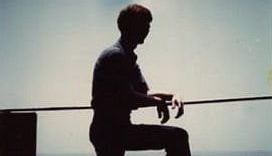Anonymous hotels on dusty roads close to chaotic ports wasn’t Nick’s favorite part of being an independent fidget. It was worse when the ship he was contracted to meet was three days late, the desk clerk he was bribing told him adherents of the latest junta had been asking about foreigners renting rooms, and it was all on his own dime until he could work.

Kaori often asked him why he didn’t work for a company, a subsidiary of a space cargo firm that ran its own fleet to recover rocket boosters from leased blocks of ocean. Companies like those rotated their fidgets two weeks at sea, two weeks at home, which Kaori felt was what she and Nick needed. Hell, if he’d taken a job with one of the sub-contractors smaller space firms hired, that would have been better than cutting his own contracts with freelancer captains in exchange for three-percent of the take. Three-percent could be a windfall of pittance.
Either way, he never had an answer for Kaori when she dropped him off at the San Diego airport. Somehow the answer always came when he saw his latest ship, even if days late and this time an old frigate, lumbering into port with a half-dozen rocket boosters lashed down aft. Forward of the bridge, a low flight deck was grafted on to pillars and underneath, shipping containers welded together to comprise his work spaces for the next four months. His answer was tied up in that and the rush he felt seeing it—the idea of being on his own, the gamble of making big money—but he couldn’t think of a way to explain that to Kaori.
Nick shoved his things into his duffle, raced down tile-decorated stairs to check out of the hotel, before jogging under a searing son toward port where bedraggled hands on either side of mooring lines were tying the old ship alongside. The captain motioned him aboard once a gangway was craned into place.
“See all that aft?” The captain said on the ship’s bridge. “We’ll make good money off that.”
Nick nodded. Booster rockets freelancers recovered from the ocean were bought up in hardscrabble ports, and repurposed into dozens of things. Nose cones became makeshift satellite dishes, livestock feeders, saltwater evaporation plates, and hut roofs. Rocket bodies in whole formed the walls of grain silos, in part they served as foundations for solar panels, and windmill blades.
“I expect we’ll find enough of that to pay you and the crew.” The captain groused. “Understand. What I want is a Deimos-5.”
Nick was confused. A Deimos-5? The Deimos series of boosters was at version 11, maybe 12. Smugglers were the only ones that still shot 5’s into the sky.
“Deimos-5.” The captain asserted. “You’ll find five drones stowed. I’ll leave it between you and the bosun for deck hands to launch and recover them. But I expect you fly them everyday.”
Nick nodded.
“You’re dismissed to find your bunk and work spaces.” The captain decided.
Nick started to move but was caught off-guard by the Bosun who had slipped silently into the bridge.
“I’ve got two hands waiting to take the fidget to quarters,” the Bosun said, “should we take his cell phone?”
Nick bolted upright in his chair.
“He’s a member of the crew for now,” the captain sneered, “so he can keep his phone.”
Nick eased out of his chair, wondering what he’d gambled himself into when he could’ve been with Kaori back home in San Diego.
This story previously appeared in 365 Tomorrows, 2023.
Edited by Marie Ginga
Andrew writes science-fiction and fantasy from the state of Maryland, often drawing ideas from jogs through forest trails at sunrise. His work has previously appeared in AntipodeanSF, 365 Tomorrows, Daily Science Fiction, Penumbric Speculative Fiction, and in MetaStellar as reprints and MetaStellar Anthhology – his work has also short-listed in several writing contests. Andrew welcomes reader feedback at dominobeanbag@gmail.com.

